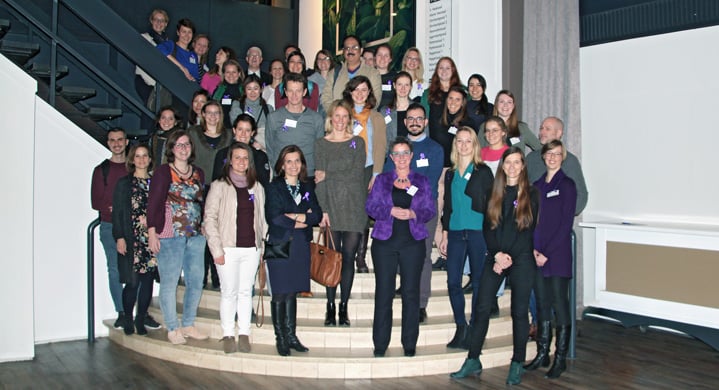In 1982, Marilyn Gentry founded the American Institute for Cancer Research with an ambitious goal: to challenge the idea that cancer could not be prevented through diet, nutrition and physical activity. Since then, there has been a massive increase in the evidence and a shift in the general attitude towards the role of these exposures as tools to prevent cancer.
The growing acceptance of the important role of modifiable lifestyle factors in cancer prevention, treatment, and recovery from cancer is largely attributable to the amount of evidence that has been generated in the field. World Cancer Research Fund’s Regular Grant Programme has invested more than £140m in research, which has led to breakthroughs in our understanding of cancer prevention and survivorship.
Investing in research has been critical in bringing us to where we are today, as colossal amounts of brain power have been dedicated to bettering our understanding of why a healthy diet, more physical activity and a healthy body weight are so effective at preventing cancer and improving cancer survivorship. Aside from this, the World Cancer Research Fund network has invested vast amounts in building capacity, and creating opportunities for early career researchers to be future health leaders.
Benefits of investing in early career researchers
Early career researchers face an array of challenges. The lack of financial support available can inhibit their access to essential resources and specialised training, impeding their potential contributions to scientific progress. Additionally, these researchers can have trouble building a professional network, limiting exposure to valuable insights and guidance crucial for career development.
Recognising these challenges underscores the importance of providing funding and training for early career researchers. Offering support to develop skills and expertise in the field empowers them to shape the future of research.
We have long been dedicated to bridging funding and opportunity gaps for early career researchers through various initiatives:
The World Cancer Research Fund Academy
We launched the Academy in 2008 to build capacity for research in our core interest areas. Since then, we have built a platform of 41 researchers from around the world. They all have different experiences, goals and ambitions, but are united by their passion for advancing their knowledge on nutrition epidemiology.
The initial investment provided researchers with an Academy fellowship to attend a nutritional epidemiology course at Imperial College London. 35 researchers attended this course, and their career progression since stands as a testament of the value of this investment.
INSPIRE Research Challenge
Last year, we launched the INSPIRE Research Challenge with the World Cancer Research Fund/American Institute for Cancer Research network. This grant call aims to invest in early career researchers’ innovative ideas and empower them to lead their own research projects. In addition to the usual exposures that we fund research in, this call also includes investigations into research areas such as sleep, stress, and host factors such as immune function.
In last year’s Challenge, we awarded more than £397,000 to 6 INSPIRE grant holders in 5 different countries: Denmark, Greece, Hong Kong, Spain and the US. Their research will delve into sleep, the immune system, stress and cancer risk.
As we continue to champion the importance of emerging researchers, we are proud to run the INSPIRE Research Challenge for a second time this year.
> Apply for this year’s INSPIRE Research Challenge
Success stories of our Academy alumni
Prof Kathryn Beck, Massey University, New Zealand (Fellow in 2016)
 Prof Kathryn Beck graduated from her PhD in 2013 and is now a professor at Massey University in New Zealand. She has a deep understanding of sports and exercise nutrition as well as dietary and body composition assessment.
Prof Kathryn Beck graduated from her PhD in 2013 and is now a professor at Massey University in New Zealand. She has a deep understanding of sports and exercise nutrition as well as dietary and body composition assessment.
Since being a Fellow of the World Cancer Research Fund Academy, she has led 9 projects and published more than 85 peer-reviewed articles. She has supervised more than 50 Master’s and PhD students to completion, and has contributed immensely to developing and validating tools to assess dietary intake, dietary patterns and associations with chronic diseases such as cancer.
She is on the INSPIRE Research Challenge Panel, reviewing applications from this year’s grant call.
Prof Beck says:
Receiving a World Cancer Research Fund Academy Fellowship meant I was able to attend the international course in nutritional epidemiology, something I had always aspired to do. This Fellowship was pivotal in my career in nutrition and dietetics research, not only through the skills and knowledge gained, but also through the connections made with other researchers from all over the world.
Read Prof Beck’s blogposts:
> Beyond nutrients: alternative approaches to analysing dietary intake data
> Understanding how people eat: a dietary pattern approach
Assoc Prof Christina Dahm, Aarhus University, Denmark (Fellow in 2009)
 Assoc Prof Christina Dahm was among the first researchers to attend the nutritional epidemiology course in 2009, after completing her PhD.
Assoc Prof Christina Dahm was among the first researchers to attend the nutritional epidemiology course in 2009, after completing her PhD.
She became a visiting scientist at the Harvard School of Public Health’s Department of Nutrition after being a Fellow, and subsequently secured an associate professorship in epidemiology at Aarhus University, Denmark. She is now moving into the critical research space of how sustainable diets can play a role in preventing cancer.
She will also be a valued member of the INSPIRE Research Challenge Panel.
> Learn more about Assoc Prof Dahm’s research
Prof Helen Coleman, Queen’s University Belfast, UK (Fellow in 2010)
 Prof Coleman was awarded an Academy Fellowship and went on to secure a postdoctoral fellowship at Queen’s University Belfast in 2013. She won the Rising Investigator Award at Dana Farber in 2016.
Prof Coleman was awarded an Academy Fellowship and went on to secure a postdoctoral fellowship at Queen’s University Belfast in 2013. She won the Rising Investigator Award at Dana Farber in 2016.
Prof Coleman is now a Professor of Cancer Epidemiology, establishing a new cohort to investigate the association between tumour markers of vitamin D, related genetic variants and colon cancer progression.
> Learn more about Prof Coleman’s research
[content_block id=5310]

